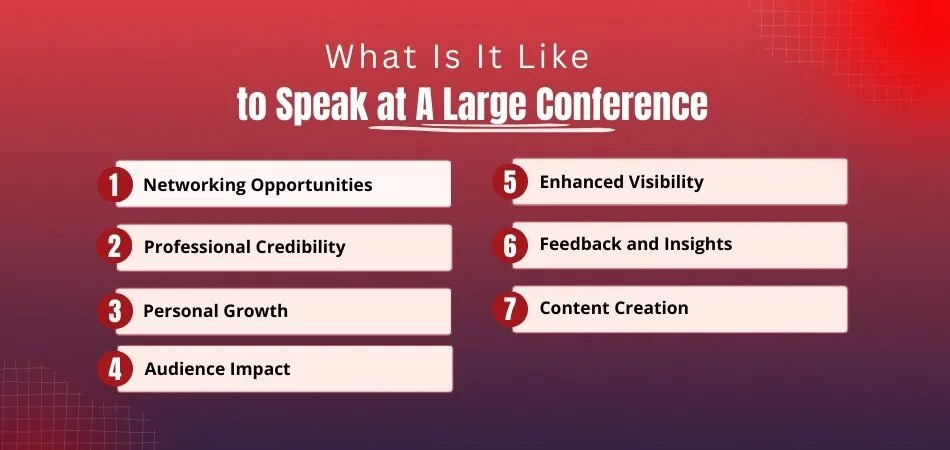Stepping onto the stage as a conference speaker can be an electrifying experience. It’s a unique blend of nerves, excitement, and the fulfilling sense of sharing knowledge with a wide audience. But what is it like to speak at a large conference?
Imagine the buzz of energy as you connect with people from all walks of life, the adrenaline fueling your words, and the satisfaction of leaving a mark on your listeners.
Despite the jitters and the exhaustive prep work, the payoff is immensely gratifying. Curious to dive deeper into this experience? Keep reading, and let’s explore the highs and lows, the ins and outs of speaking at a grand event.
A Quick Overview of the Conference Speakers
Conference speakers often come from diverse backgrounds, each bringing unique insights and stories to the stage. They engage the audience, sharing knowledge and sparking discussions, which can lead to new ideas and connections.
These speakers prepare meticulously, tailoring their messages to resonate with the attendees. On stage, they face the dual challenge of managing their nerves while delivering impactful presentations, aiming to leave a lasting impression on their audience.
Different Types of Conference Speakers
Conference speakers are as varied as the topics they cover, each bringing their own flair and expertise to the stage. They range from industry experts to motivational gurus, all aiming to inform, inspire, or ignite change. Identifying the type of speaker can help attendees set their expectations and maximize their experience.
Keynote Speakers
Often the highlight of the conference, keynote speakers bring a wealth of experience and prestige. They set the tone for the event, sharing innovative ideas and sparking curiosity. Their talks are usually highly anticipated and designed to inspire broad thinking among the audience.
Panelists
These speakers engage in group discussions, offering different viewpoints on specific topics. They interact with each other and the audience, providing a multifaceted perspective on complex issues. This dynamic setup encourages lively debate and direct engagement with attendees.
Workshop Leaders
Hands-on and interactive, workshop leaders provide practical skills and knowledge. Participants get the chance to dive deep into subjects, asking questions and applying what they learn in real-time settings. This format is ideal for those looking to gain specific skills or insights.
Motivational Speakers
With stories that touch the heart and energize the spirit, motivational speakers aim to inspire action. They connect with the audience on an emotional level, often leaving them with memorable takeaways and a renewed sense of purpose.
Every conference speaker plays a unique role in enriching the event’s experience. Whether they’re sharing cutting-edge research or personal anecdotes, each type contributes to the overall tapestry of the conference. So next time you attend an event, remember the diverse perspectives each speaker brings to the podium.
What Is It Like to Speak at A Large Conference?
Speaking at a large conference is an exhilarating mix of nerves and triumph. It’s about stepping into the spotlight, sharing your passion, and connecting with an audience on a grand scale. This unique experience is both daunting and immensely rewarding.
Networking Opportunities
Engaging as a speaker opens doors to new professional connections and collaborations. You’ll meet like-minded individuals, industry leaders, and potential mentors. These interactions can lead to fruitful partnerships and open new avenues in your career.
Professional Credibility
Being a conference speaker boosts your reputation within your field. It positions you as an authority and thought leader, attracting attention from peers and media alike. This recognition can elevate your professional standing and open up new opportunities.
Personal Growth
The preparation and delivery of a conference speech push you out of your comfort zone. You’ll hone your public speaking skills, learn to handle pressure and improve your ability to articulate ideas clearly. This growth is invaluable and transcends professional boundaries.
Audience Impact
The chance to influence and inspire a wide audience is a unique benefit. You can share your insights, experiences, and ideas, potentially changing perspectives or inspiring action. This impact can be deeply fulfilling, affirming the value of your message and work.
Enhanced Visibility
Speaking at a large conference significantly boosts your visibility in your industry and beyond. It puts your name, work, and ideas in front of a broad audience, including potential employers, clients, or collaborators. This increased exposure can lead to more opportunities, such as invitations to speak at other events or contribute to publications.
Feedback and Insights
Presenting your ideas to a large audience provides valuable feedback and fresh perspectives. Attendees might pose questions or offer critiques that you hadn’t considered, helping you refine your thoughts and approaches. This feedback loop is crucial for personal and professional development.
Content Creation
Speaking engagements provide content that you can repurpose in various formats. You can share your speech on social media, write articles based on your talk, or create educational materials. This content can further establish your expertise and attract a wider audience.
You can grow professionally and personally by speaking at a conference; it’s not just about sharing knowledge. You’ll get benefits beyond the stage, too, like networking, credibility, and personal development.
Required Qualifications to Become a Conference Speaker
Becoming a conference speaker is a notable achievement that many aspire to. It’s a role that demands more than just knowledge; it requires a blend of skills, experience, and personal qualities. Here are the required qualifications:
- Expertise in Your Field: You must possess deep knowledge of your subject matter. This expertise is often demonstrated through years of experience or academic study.
- Public Speaking Skills: Effective communication is key. You should be able to convey complex ideas clearly and engagingly to a diverse audience.
- Unique Perspective: Bringing a fresh, unique viewpoint to common issues can set you apart. Your approach should offer new insights or solutions to your audience.
- Professional Achievements: A track record of significant professional achievements can bolster your credibility. These accomplishments show your commitment and impact in your field.
- Community Involvement: Active participation in your professional community is beneficial. This involvement can include writing articles, volunteering, or participating in industry events.
- Personal Brand: A strong personal brand can help you get noticed. This includes an online presence that showcases your expertise and contributions.
Building your reputation and honing your craft is the key to becoming a conference speaker. Sharing your knowledge and connecting with others is more than just being an expert. With dedication and effort, you too can share your insights with the world.
Tips to Help You Speak Confidently at A Large Conference
Speaking at a large conference can be an intimidating experience, even for seasoned professionals. It’s normal to feel nervous, but preparation and mindset can significantly boost your confidence. Below are some practical tips to help you deliver a captivating and confident presentation.
- Know Your Material: Understand your topic inside and out. Confidence comes from knowing what you’re talking about in depth.
- Practice Regularly: Rehearse your speech multiple times. Familiarity with your content will reduce anxiety and improve delivery.
- Engage with the Audience: Make eye contact and interact with your listeners. This creates a connection and makes the experience more enjoyable for everyone.
- Use Visual Aids: Well-designed slides or props can enhance your message. They also provide focal points for both you and your audience.
- Manage Your Breathing: Practice deep breathing exercises before going onstage. This can help calm nerves and steady your voice.
- Prepare for Questions: Anticipate what your audience might ask. Preparing responses in advance can help you handle the Q&A session confidently.
- Dress for Success: Wear something comfortable yet professional. Feeling good about your appearance can boost your confidence.
FAQs about What is it Like to Speak at a Large Conference?
Speaking at a large conference is a unique and enriching experience that many professionals look forward to. However, it can also raise many questions, especially for first-timers. Here are a few common frequently asked questions to help demystify the process.
What Should I Expect When Speaking at A Large Conference?
Expect a diverse audience, a sizable venue, and potentially a mix of in-person and virtual attendees. You’ll experience a dynamic environment where you can share your insights and connect with others in your field.
How Can I Prepare for My Speech?
Start by researching your audience and tailoring your content to their interests and knowledge level. Practice your speech multiple times, refine your visual aids, and prepare for possible questions. Familiarize yourself with the venue and technology beforehand.
What if I Get Nervous Before Speaking?
Nervousness is normal. Try deep breathing exercises, positive visualization, and rehearsing your opening lines. Remember, the audience is generally supportive and interested in what you have to say.
How Long Should My Presentation Be?
Conference organizers will typically provide a time slot for your presentation. Plan your content to fit within this timeframe, leaving room for questions. A clear, concise presentation is often more impactful than a longer one.
How Can I Engage the Audience During My Presentation?
Start with a compelling story or question, use interactive elements like polls or quizzes, and encourage questions. Make eye contact and vary your tone and pace to maintain interest.
What Should I Do if I Forget Part of My Speech?
If you lose your place, take a moment to glance at your notes or take a deep breath to regain your composure. It’s okay to pause; it shows confidence and helps you collect your thoughts.
How Can I Get Feedback on My Presentation?
Ask for feedback from peers or mentors before the conference. After your talk, engage with audience members, and don’t shy away from asking for their thoughts. Many conferences also provide formal feedback mechanisms.
Final Brief
A big conference speaker is a testament to their dedication and expertise. There is a lot to learn and a lot to develop personally as a result of this adventure. If you ask yourself the question, “How does it feel to deliver a speech at a large conference?” it is clear that the experience is one of a rich tapestry of emotions, opportunities, and opportunities for growth.
The platform provides you with an opportunity to share your passion, influence others, and expand your professional horizons at the same time. As you prepare, remember the importance of connecting with your audience, honing your message, and embracing the moment. This path not only shapes you as a speaker but also as an influential figure in your field.








